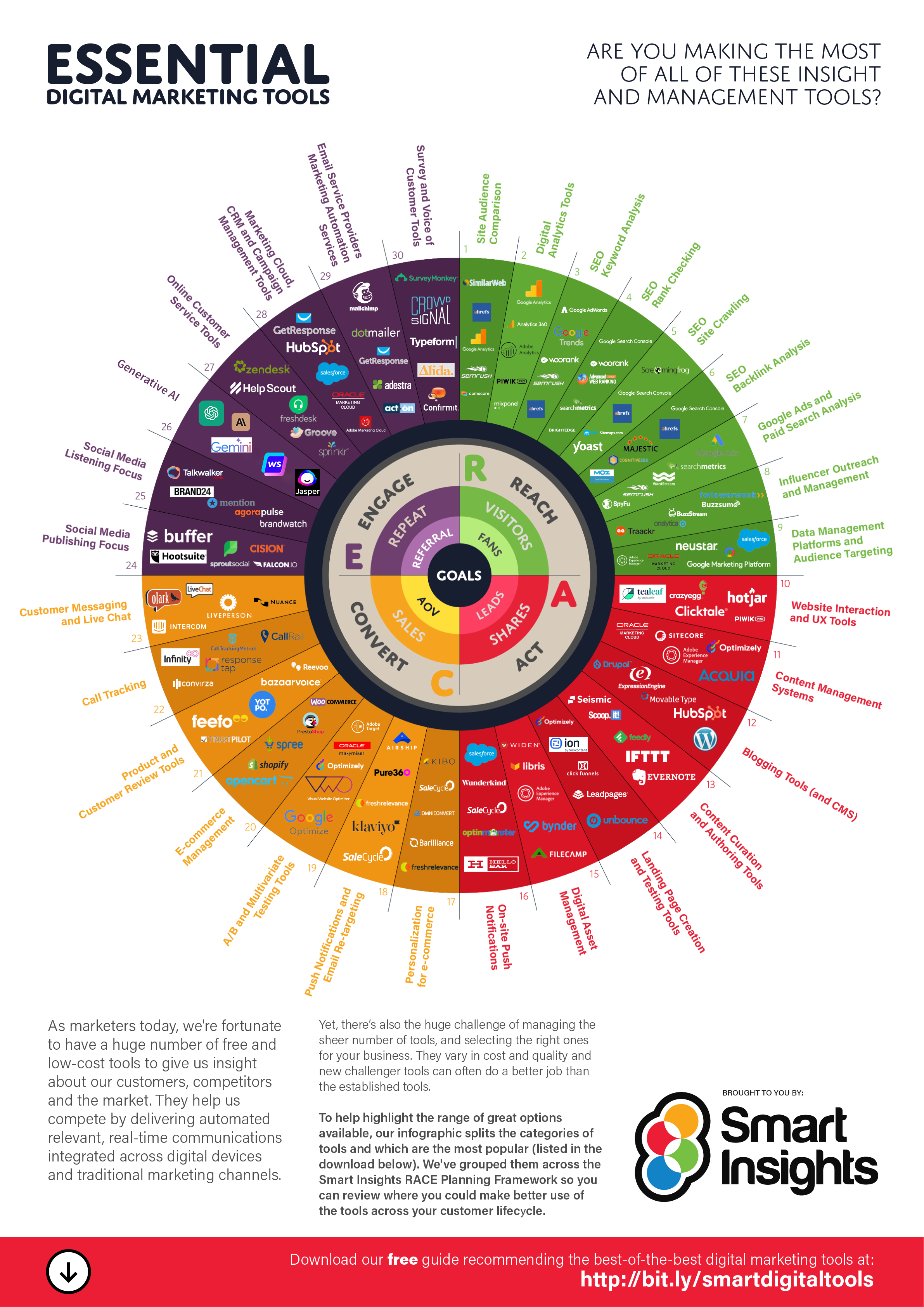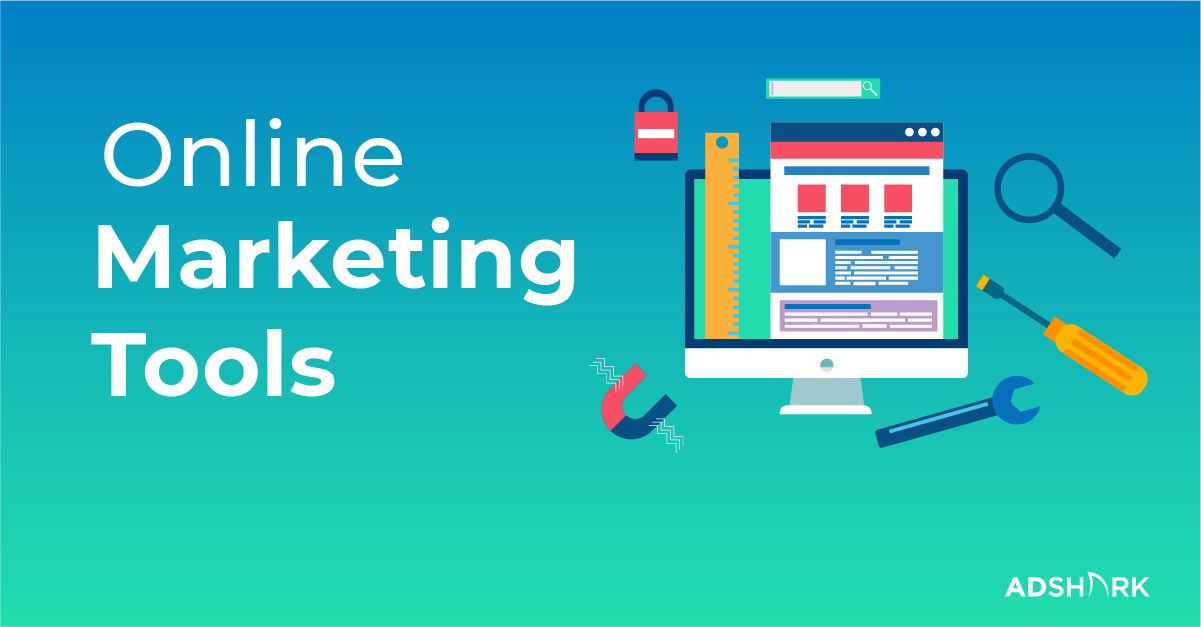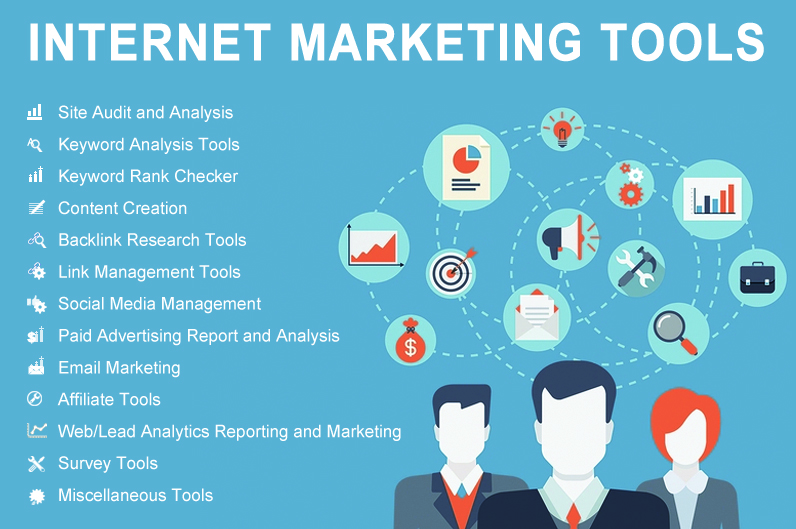In today’s digital world, online marketing is key. Businesses need good tools to succeed.
These tools are the backbone of any good digital plan. They help businesses find their audience. They also help track how well things are going. Tools simplify tough tasks. They save time and make work easier.
Many options exist, and picking the right ones can feel hard. This guide shows you top online marketing tools. You will learn how they help your business. They help reach your goals. Let’s explore the tools that can change your marketing.

Credit: www.smartinsights.com
Understanding Online Marketing Tools
Online marketing tools are now a must for all businesses. These tools make marketing smoother. They save both time and money. We will now look at the basics of these tools.
Why Online Tools Are Important
Online tools make many tasks easy. They help track how things are performing. They manage campaigns. They also help reach more people. Marketing can feel overwhelming without them.
Businesses use these tools to know their audience better. They give useful information and data. This helps make smart choices.
How They Help Your Business
Using online marketing tools brings many good things. Here are a few key benefits:
-
Efficiency: Tools automate tasks. This saves time.
-
Cost-effective: You need fewer people on your marketing team.
-
Analytics: Get insights to make marketing better.
-
Reach: Connect with people worldwide easily.
Here is a summary of these benefits:
| Benefit | Description |
|---|---|
| Efficiency | Automate tasks and save time. |
| Cost-effective | Reduce marketing costs. |
| Analytics | Get insights to improve plans. |
| Reach | Connect with a global audience. |

Credit: adshark.com
SEO Tools for Visibility
Online marketing tools boost your website’s search engine presence. SEO tools help make your content better. This makes it easier for people to find you. They offer advice that improves your website’s ranking. Let’s explore some important SEO tools.
Keyword Research
Finding the right keywords builds a strong SEO plan. It helps you know what people search for. This makes sure your content fits their needs. Here are some popular keyword tools:
-
Google Keyword Planner: This free tool gives keyword ideas and search numbers.
-
Ahrefs: It offers deep keyword analysis. It also shows what competitors do.
-
SEMrush: This tool helps with keyword research. It tracks and analyzes.
Site Audits
Checking your website regularly keeps it healthy. Site audits find and fix problems. These problems might hurt your site’s performance. Audits cover many things, such as:
| Aspect | Description |
|---|---|
| Technical SEO | Checks site speed, mobile use, and security. |
| On-page SEO | Analyzes content, keyword use, and meta tags. |
| Backlinks | Checks the quality and number of links to your site. |
Some notable site audit tools are:
-
Screaming Frog: It gives a detailed site analysis. It also finds errors.
-
Google Search Console: This free tool shows how your website performs.
-
SEMrush: It has many site audit features for a full review.
Social Media Management Tools
Social media tools are essential for businesses today. They make tasks easier and more efficient. These tools help manage many social media accounts. They save time and ensure regular posts. Let’s look at two key features.
Scheduling Posts
Scheduling posts is a key feature. It lets you plan content ahead of time. This ensures regular updates without manual work. You can set posts to go live at busy times. This gets more people to see them. Many tools show a calendar. This makes it easy to see what posts are coming.
Analytics And Reporting
Analytics and reporting show how well your social media is doing. These features track things like likes, shares, and comments. They help find which posts work best. You can better understand your audience. This data guides future content plans. Many tools also offer custom reports. These are good for sharing results with your team.
Email Marketing Tools
Email marketing tools are vital for digital marketing. They help businesses connect with customers. The right email tool saves time. It also increases engagement. Let’s explore some key features.
Automation Features
Email tools have automation features. These make campaigns smoother. Automation lets you send emails based on specific actions. For example, you can send welcome emails to new sign-ups. You can also send follow-ups after a purchase. This saves time. It also ensures timely messages.
These tools often include templates. You use these to create good-looking emails fast. Some popular automation features include:
-
Welcome emails
-
Cart reminder emails
-
Birthday or anniversary messages
-
Emails to bring back old customers
Segmentation And Targeting
Good email marketing relies on dividing and targeting customers. These tools let you group your audience. You can group them by location, past purchases, or how much they engage. This makes sure your emails are right for each person.
Targeting specific groups can increase email openings and sales. Here are common ways to segment:
-
Location
-
Age
-
Purchase history
-
Email engagement
Sending focused emails gives value to your audience. This builds stronger relationships. It also keeps customers coming back.
Content Creation Tools
Online marketing tools are key for good digital marketing. Content creation tools are very important among them. They help marketers make good visuals and videos. Well-made content gets people’s attention. This improves engagement and sales.
Graphic Design
Graphic design tools are very helpful for making visual content. Tools like Canva and Adobe Spark are popular. They offer templates and easy ways to use them. These tools help you make strong graphics. You can design social media posts, charts, and more. Good design makes your brand look better.
Video Editing
Video editing tools are needed for making good videos. Programs like Adobe Premiere Pro and Final Cut Pro are industry standards. For new users, tools like iMovie or Filmora are great. These tools help you edit, cut, and add effects. High-quality videos can boost your online presence. They make your content more shareable.
Analytics And Reporting Tools
Analytics and reporting tools are vital for online marketing. They help marketers understand their audience. They measure how well campaigns do. They also help make choices based on data. These tools show numbers and present data clearly.
Tracking Metrics
Tracking numbers is essential to see marketing performance. Key numbers include:
-
Website Traffic: How many people visit your site.
-
Bounce Rate: The number of visitors who leave after one page.
-
Conversion Rate: The number of visitors who do a desired action.
-
Click-Through Rate (CTR): Clicks on an ad versus how many times it was seen.
These numbers help find what works. They show what needs work. Checking regularly keeps campaigns on track. It helps meet goals.
Data Visualization
Data visualization turns raw data into pictures. This makes it easier to understand. Common ways include:
-
Charts and Graphs: These show trends over time.
-
Heatmaps: They show where users click on a page.
-
Dashboards: They give a quick view of key numbers.
Seeing data helps spot patterns fast. It also helps present data to others clearly. Tools like Google Analytics and Tableau offer strong visualization features.
Using analytics and reporting tools can greatly improve your online marketing. You get valuable insights by tracking numbers and seeing data. These insights lead to better choices and overall performance.
Customer Relationship Management (CRM) Tools
CRM tools are important for online marketing. They help businesses handle talks with possible and current customers. CRM tools make processes smooth. They improve customer happiness and boost sales. They also show useful insights into customer behavior.
Lead Management
Managing leads is a key part of CRM tools. It helps businesses track potential customers. CRMs organize leads by their place in the sales journey. This organization makes follow-up easier. Businesses can focus on leads most likely to buy.
Lead tools allow for automated follow-ups. This ensures no lead is missed. It also saves time. With full details on each lead, businesses can tailor their approach. This raises the chance of a sale.
Customer Segmentation
Dividing customers into groups is another key CRM feature. This means sorting customers by traits. These traits can include age, actions, or past purchases. Segmentation lets businesses customize their marketing.
Personalized marketing campaigns get better engagement. Customers see content that fits their interests. This makes customers happier and more loyal. With CRM tools, segmentation is easy and quick. Businesses can adjust their plans fast based on customer data.

Credit: www.7boats.com
Advertising Tools for Reach
Advertising tools are crucial for any online marketing plan. They help businesses effectively reach their audience. Let’s look at two powerful advertising tools: Pay-Per-Click (PPC) and Display Ads.
Pay-per-click (ppc)
PPC is a popular advertising method. You pay a fee each time someone clicks your ad. This brings instant traffic to your website. It costs less because you only pay for actual clicks. Google Ads is a known PPC platform. Other platforms include Bing Ads and Facebook Ads.
PPC ads show on search results pages. They also appear on partner websites. Good keyword research is the key to strong PPC. Use tools like Google Keyword Planner to find relevant keywords. Write good ad copy to get clicks. Check your campaigns often to make them better.
Display Ads
Display Ads are visual ads. They appear on websites, apps, and social media. These ads come in many forms. They include banners, images, and videos. Display Ads are great for brand awareness. They can get the attention of potential customers.
Google Display Network (GDN) is a popular choice for display ads. Facebook, Instagram, and LinkedIn also offer display ad choices. Design your ads to look good. Use clear images and messages. Target your audience by interests, age, and behavior. This makes sure your ads reach the right people.
Track your ad performance. Use numbers like views, clicks, and sales. Adjust your plans based on these insights. Effective display ads can boost your online presence. They can also drive traffic.
Picking the Right Tools
Choosing the right online marketing tools can change your business. It helps you reach your audience. It helps you reach your goals. This section covers key things to think about. We will discuss budget and growth. Understanding these points helps you make smart choices.
Budget Considerations
Money matters. Your budget affects which tools you can get. First, decide how much you can spend. Then, compare features and prices. Here’s a simple table to help:
| Tool | Cost | Features |
|---|---|---|
| Tool A | $50/month | Email Marketing, Analytics |
| Tool B | $75/month | SEO, Social Media Management |
See if the features are worth the cost. Sometimes, a cheaper tool has what you need. Other times, spending more gives better results. Try free trials. They let you test tools before buying. This stops you from wasting money.
Scalability
Think long-term. Will the tool grow with your business? Growth is very important. A tool that works for 100 customers might not work for 1000. Check if the tool can handle more. This can include:
-
More data handling
-
More user accounts
-
Advanced features for bigger needs
Here are some questions to ask:
-
Can the tool handle more data?
-
Does the price support business growth?
-
Are there advanced features for future needs?
Choosing tools that can grow saves you from changing later. It helps keep things steady. Focus on tools that support your growth. This ensures smooth transitions and continued success.
Frequently Asked Questions
What Are Online Marketing Tools?
Online marketing tools help businesses sell products and services online. They include SEO tools, email platforms, social media schedulers, and analytics software.
How Do Online Marketing Tools Work?
Online marketing tools make tasks smoother. They help with content creation, sharing, and tracking performance. They automate steps, saving time and making work better.
Which Online Marketing Tools Are Best?
Top online marketing tools include Google Analytics, Mailchimp, Hootsuite, SEMrush, and Canva. These tools offer strong features for many marketing needs.
Why Use Online Marketing Tools?
Top online marketing tools include Google Analytics, Mailchimp, Hootsuite, SEMrush, and Canva. These tools offer strong features for many marketing needs.
Conclusion
Online marketing tools simplify your promotion. They save time and work better. These tools help you reach more people. You can track progress and make smart choices. Simple and effective, they boost your marketing. Start looking at these tools today.
Your business deserves the best tools. Keep learning and stay updated. Online marketing success is truly possible for you.



Leave a Reply